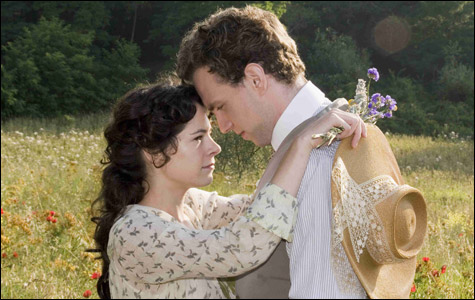 |
If you think Helena Bonham Carter, Julian Sands, Daniel Day-Lewis, Maggie Smith, Denholm Elliott, Judi Dench, and Kiri te Kanawa singing “O mio babbino caro” in the 1985 Merchant Ivory adaptation of E.M. Forster’s 1908 novel A Room with a View are all hopelessly overrated, then WGBH/ITV has your TV movie. Already this year, WGBH has undertaken to improve on the state of Jane Austen adaptations. (Northanger Abbey did; Mansfield Park and Persuasion didn’t; Sense and Sensibility had a fine Elinor Dashwood.) Now, perhaps taking its cue from another Forster novel, Where Angels Fear To Tread, WGBH has remade Merchant Ivory’s Oscar-nominated film. The new version — which airs this Sunday, April 13, at 9 pm — is helmed by Austrian TV director Nicholas Renton (who directed the 1998 WGBH/Granada Far from the Madding Crowd), with a screenplay by Andrew Davies (who did the screenplays for the ’GBH Northanger Abbey and Sense and Sensibility) and a rather less prepossessing cast headed by Elaine Cassidy as Lucy Honeychurch, Laurence Fox as Cecil Vyse, Rafe Spall as George Emerson and his father, Timothy Spall, as Mr. Emerson, and Sophie Thompson as Charlotte Bartlett.
This is, however, a Room with a new view, Davies’s screenplay “completing Forster’s passionate love story by imagining the poignant aftermath that must have been.” Our “completed” story starts in 1922, in Florence, with Lucy, alone (you’ll guess why, even if you can hardly imagine that the Emersons would be anything but Conscientious Objectors), taking a room at the Pensione Bertolini, where she and George met and returned for their honeymoon. The tale unfolds in long flashbacks, and we learn that it all started in 1912 (Forster obviously has an earlier period in mind); now Lucy is back, achieving a degree of closure and perhaps making a new beginning with an old friend. The Merchant Ivory film squeezed a good deal of Forster’s 250-page novel into its 116 minutes; this Room is cramped at 83 minutes, especially with 10 of those given over to Lucy’s post-war adventure.
This being an Andrew Davies affair, moreover, it’s blatant — and occasionally ridiculous — where Forster is subtle. Of the fatal first kiss between Lucy and George, Forster writes, “He stepped quickly forward and kissed her.” Lucy has no time to speak, or even feel, before Charlotte arrives. Davies’s Lucy and George kiss, nuzzle, check, grope, resume — James Bond hopped into ladies’ beds on less acquaintance. The second kiss is so elongated, Lucy and George can later argue over it: “You kissed me back!” “I did not!” In Forster’s novel, Charlotte dresses down George in the Bertolini drawing room; here she accosts him as he’s exiting the pensione’s bathroom, bare-chested and clad only in a large towel, and orders him to come to her room. No surprise, then, that when Lucy finally makes up her mind, she races down to the Sacred Lake and, fully clothed, tumbles in to embrace George, who — what luck! — happens to be bathing naked there. Or that when she spots Mr. Beebe in an alley talking with two Florentine men, she appears to know what’s going on, even though Forster leaves open the question of whether Mr. Beebe is closeted and he himself doesn’t seem sure.